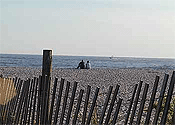Bits of S J - Woodbury & Cape May
 As you travel throughout the eastern shores of our country you will find that the Quakers had a great deal to do with the formation of many communities. From the New England states to the south, Quakers were noted for their religious beliefs and their enterprising spirits. They helped, through their beliefs, to pave the way to self-rule. This did not please England in the least, yet by the time the American Revolution was in motion, English, Scott and Irish Quakers had stirred up enough defiance to the crown in many southern New Jersey communities, that revolution was inevitable.
As you travel throughout the eastern shores of our country you will find that the Quakers had a great deal to do with the formation of many communities. From the New England states to the south, Quakers were noted for their religious beliefs and their enterprising spirits. They helped, through their beliefs, to pave the way to self-rule. This did not please England in the least, yet by the time the American Revolution was in motion, English, Scott and Irish Quakers had stirred up enough defiance to the crown in many southern New Jersey communities, that revolution was inevitable. The City of Woodbury was founded in 1683 by Henry Wood. He was from Bury, England and he was a Quaker. Woodbury became a populous of Quaker interaction. It also became a center of activity during the American Revolution. In 1777, the British General Lord Cornwallis set up headquarters in Woodbury. Can you imagine the enemy entrenched in your community, not knowing if victory would be shadowed by the oncoming Hessian troupes at Fort Mercer. Fortunately for the citizens of Woodbury the colonial army, outnumbered ten to one, defeated the Hessian troupes and Cornwallis eventually moved north toward Philadelphia.
After the war, Woodbury became the County Seat taking that title from Gloucester City in 1786. By 1871 it was incorporated as a City. Most of the original buildings from the 18th century are gone now, but as history records Woodbury was an outstanding asset in the war for freedom.
Again, the Quaker influence forged another community called Cape May. It cannot be mentioned concerning the Quaker influence without acknowledging probably the most famous Quaker to the area, William Penn. He established the City of Philadelphia through a “favor” that was due his father, thus he inherited Philadelphia. He also established the foundation for governmental rule in Cape May. Trade between Philadelphia, Baltimore and other cities gave way to visitors looking for a place to get away from the hot, muggy environments during the summer months. Advertisements were placed in Philadelphia newspapers as far back as 1801 for hotels, restaurants and gambling casinos. Local residents often rented out rooms to visitors until it became apparent that tourism was a new resource of wealth. Cape May was not just a place to visit it also produced food, through farming, glasswares, fisheries and shipbuilding. Some plantations included more than 1000 acres of land.
After the Civil War, Cape May began its economic redevelopment. Elegant cottages, hotels, cafes, summer homes and more were built. Entertainment became a lure for more tourists and Cape May quickly became the hot spot for summer recreation. If you have ever been to Cape May you know how rich this town is in the Victorian era. The streets are lined with the most elegant mansions and picture post-card cottages. Many towns had their beginning in agriculture and eventually gave way to industrialism but Cape May seemed to always know what its destiny was.
advertisement

Author: Vickie Van Antwerp
Archives
Collingswood
A Southern Mansion
Light up the Night
Dining Alfresco
Sink or Swim
Throwing Shade
The Outdoors in Order
The Foundation
A New Spin on Swim
Gloucester Township
Wonderful Water
The Foundation: June, 2015
Community Connection: Moorestown
Things to Do
Cinnaminson
More...







